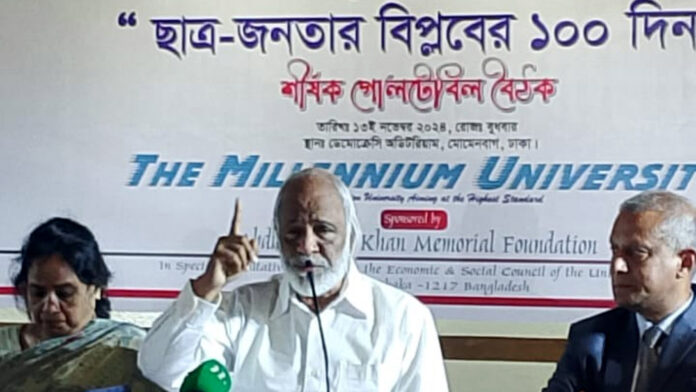Abdul Moin Khan, a member of the BNP Standing Committee, urged the interim government to overcome all obstacles and return the mandate of the people's right to vote. He said that people's government should be established through fair and impartial elections. The faster they move on that path, the better for the country.
He said these things in a round table meeting at the Democracy Auditorium of the Millennium University at Momenbagh in the capital on Wednesday.
The university organized a round table meeting titled '100 Days of Student-People's Revolution'. It was presided over by Advocate Rokhsana Khandkar, Chairman of the Board of Trustees of The Millennium University.
“This government is going to make a law,” said Moin Khan, referring to the creation of a new law to legitimize the work of the interim government. I think it is an indemnity act. Why does the interim government have to pass this law after 100 days? Why fear entered the government's mind, why the indemnity law? I am worried about this law. This government is in power with the unwavering support of the people. Here the question of law is only obligation.'
Moin Khan also said that the 100 days of the interim government and the 100 days of the student revolution are completely different. An unprecedented revolution took place in Bangladesh on August 5. The people of Bangladesh have taken back their rights by occupying Ganobhaban on August 5. August 5 was a real people's revolution.
At this time, Moin Khan said to the students that the character and psychological changes of the people of Bangladesh are coming. The August 5 student movement will go down in world history. There is a revolution, there is a counter-revolution. There will be setbacks, there will be obstacles, there will be discussions and criticisms, and we have to move forward through them. Basic rights of people should be given back.
Addressing the Awami League, he said, 'We made a mistake during the formation of the government in 1971. I wanted to build Bangladesh together. A political party did not respond then. The same political party has looted and fled Bangladesh for the past 15 years. Today, through the revolution of the students, that moment has been re-emerged in Bangladesh. By giving up personal and party interests, everyone should unite to make Bangladesh a welfare state.'
Mahmudur Rahman Manna, President of Nagorika Oikya, said that politics must be restored first. Whatever it takes to make a democracy out of fascists needs to be done. Why all the reforms have to be done by the interim government, most of the reforms will be done by the elected government.
Commenting on the appointment of three new advisers as 'boy's play', he said that if the country is to be transformed from fascism to democracy, the situation must be faced with patience. Therefore, an acceptable election should be arranged as soon as possible.
Jonaid Saki, the chief coordinator of the Mass Solidarity Movement, said, 'Political parties have recognized the role of students. The current government is our government, there is nothing to compete with it. This government is not our opponent.
Bure Saki expressed the hope that the interim government will leave after certain reforms, said, 'If the country is to be transformed from fascism to democracy, the situation must be faced with patience. Running the government only through state institutions will create distance with the people day by day. The appointment of the last adviser required consultation with the political parties, otherwise such a situation would not have arisen. If the government fails, we will fail.' He urged the interim government to carry out the reforms on the basis of consensus with the political parties.
Rashed Khan, General Secretary of Gana Odhikar Parishad, Subrat Chowdhury, Co-Chairman of Gano Forum also spoke at the round table meeting.

